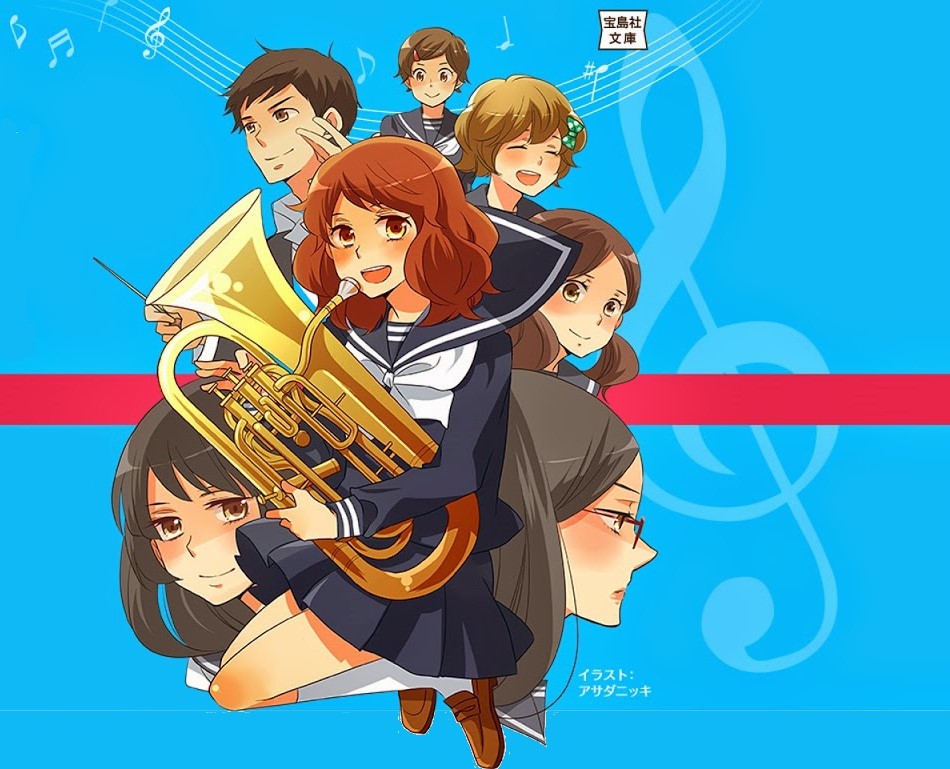
Euphonium Fanbook Interview – Author Ayano Takeda
We’ve been covering the anime adaptation of Hibike! Euphonium every week, but today we’ll look at the roots of the series instead. Our recurring collaborator megax returns to translate a long interview with its original writer, the young Ayano Takeda.
A super long interview with the creator of Sound! Euphonium, Ayano Takeda! What prompted her to create this immensely popular series, her feelings for her hometown of Uji, why she became a writer and more! This interview is packed with important news. (Coverage/Writing: Yuuko Takakura)
– First, can you tell us what prompted the birth of Sound! Euphonium?
Takeda: When I went to the meeting about the revision of my debut novel, We Breathed Together Today, the topic of “what do you want to write for your next work?” came up. During that discussion, I mentioned that I wanted to write something about wind music since I had experience in that topic. I’d loved reading works that had a wind music motif ever since I was a middle schooler, but a lot of those titles had the point of view set from the advisor, where it was overlooking the entire story and a little bit removed from actually playing music. I wanted to try depicting wind music from the inside of the club itself. Also, I would begin writing it when I was in my second year in university. I thought that this would be a story I couldn’t write later as my memories of high school were still vivid and that was what started the series.
– The title for the series is impressive. Was that decided from the start?
Takeda: One of the candidates was to combine the simple so-called “(blank) high school concert band” with a musical instrument’s note like “Roar! Trombone” or “Howl! Trumpet” in this kind of pattern. When it was determined that the protagonist, Kumiko, would play the euphonium, the title was set as “Sound! Euphonium.” The editor asked “what does a euphonium sound like?” and the number one sound it makes is a “resound” (Hibike), so that became the title.
Since I would be depicting the story from an experienced musician, I wanted band members to certainly feel that aspect. In order for them to understand “this author knows music,” I think using the euphonium as an instrument was very effective. If I didn’t have history as a musician, then there are many other instruments that someone who didn’t know music would’ve picked. Plus, if I were playing the euphonium, wouldn’t I 100% pick this book up? (laughs)
–The protagonist, Kumiko, goes to a fictional high school in Uji called “North Uji,” right?
Takeda: At the start, there wasn’t any specific area that we settled on for the story to take place in, but as I wanted to set the work in Uji, where I grew up, I started inserting place names. Since “Uji High School” existed in the past, I changed it a bit to “North Uji High School.”
– A lot of sightseeing spots from Uji show up.
Takeda: It also feels partially forcibly inserted too. (laughs) I was aware of the “major sightseeing attractions.” I chose to mention whenever possible the spots that anyone would go to like Byoudouin, Pagoda Island, and Amagese Dam. I was surprised when an extraordinary amount of fans went to Mt. Daikichi. That is a standard outing for kindergarteners to go to and people in the area like to go up its course whenever they like. It’s not a so-called “major sightseeing attraction,” so I was happy when I heard about the great response it got.
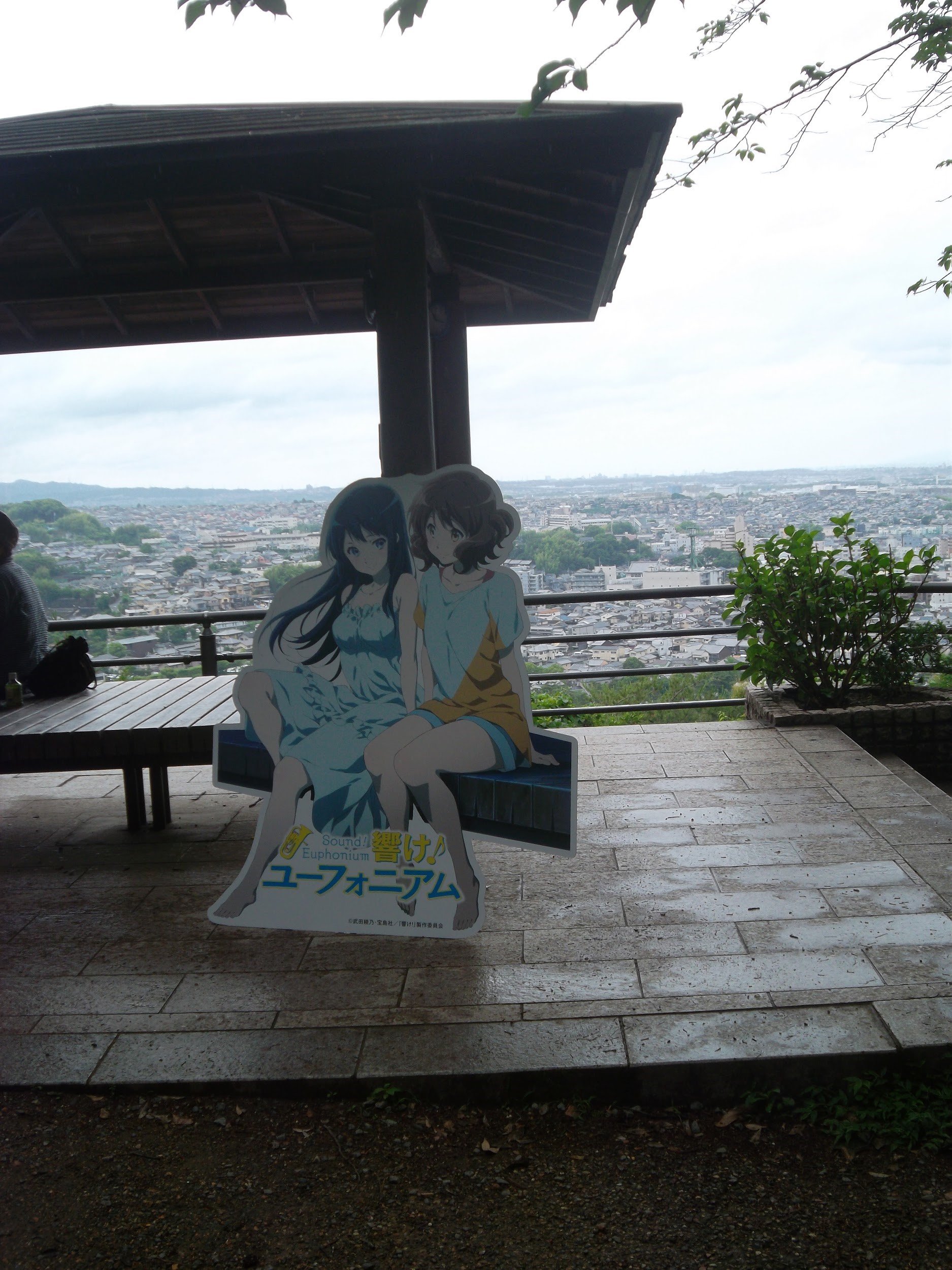
– How did you model your characters?
Takeda: When I decided to write about wind music, I got a lot of input from various people like my friends who were in the band in middle school, and friends of those friends. I was greatly influenced by those meetings. Also, it feels like I used my and their traits and experiences when modeling the characters. I didn’t project myself on any of the characters though. (laughs)
When I was thinking about the plot, I thought about putting Reina, not Kumiko, as the protagonist. It was only the trumpet solo competition with Kaori that she had though. But if she were the protagonist, then it would be a story about this musically talented first year would clash with the upperclassmen and feel like it’s judging people who don’t have a lot of passion for the club…. Thus, the character of Kumiko, a person who would be a step back and calmly observe the surroundings and furthermore be in a storytelling role, was born.
– Kumiko’s surname ‘Oumae’ is rare, isn’t it?
Takeda: I was influenced by an upperclassman I had who was named Oumae-san. Besides, I wanted to insert some surnames that you would hear around Kyoto like “Yoroizuka.”
Fleshing out the characters by thinking of Pairs (contrasts)
– A concert band is like a large family, so wasn’t it difficult to distinguish between characters?
Takeda: It was. I consciously created parameters so that characters wouldn’t resemble each other. Those are attributes of characters created in things like games to quantify and balance everyone out. On that track, one may be strong mentally, but not good at something else, one may be good at performing, but horribly socially. I fine-tuned everyone so there wouldn’t be the same type of character.
Also, I thought about two characters together as pairs (contrasts) to balance between them. Like with Kumiko and Reina, you have a calm person and a fiery person, with Sapphire and Hazuki, you have an experienced musician and a beginner. If I swapped pairs, then I was careful not to crown one over the other.
– What an amazing character modeling strategy! Please tell us about other secrets concerning the main characters.
Takeda: Sapphire was a character born while I was writing. People would lose interest in the long gap before Taki-sensei shows up, so I wanted to insert a character with impact to fill in that gap. She’s a naïve person with a cutesy name, so she’s practically a modern-day female high schooler! I thought about assigning her the role of mood maker.
Shuichi is a “convenient fellow.” Kumiko has a bit of a bothersome personality, so there needed to be a character that looked out for her by her side. In my mind, he wasn’t handsome, so when I saw Asada Nikki-san’s illustration for the first cover, I was shocked. (laughs)
Yuuko is a necessary character that is wrong in the plot, but was created to have an impression of Kaori that she’s this magnificent person. It was very fun to write how she and Sapphire acted. Conversely was Kumiko. I’ve never known someone who was fundamentally passive, so writing how she would act was difficult.
– I can understand. The adviser Taki-sensei is very popular, but, as the author, how do you view him?
Takeda: He’s a teacher who is fascinated with the evolution of technology. He’s poor at handling students, so he still has a way to go as an adviser. He feels like… he’s a person who’s very blunt and will say harsh things to express. (laughs) But that type of mentor happens sometimes in wind music. Though he’s strict and won’t hold anything back when speaking, he has charisma, so the students respond to that.
I was poor at writing adults in the past. It’s difficult for me to write about a generation of characters who’ve experienced a different world than I have. So when it came time to release volume 2, I interviewed a famous music director at Sugunami High School, Igarashi-sensei. One thing he said, “Wind music is where adults (advisors) and students stand together on the same stage. It’s fun,” stuck in my heart.
What wasn’t written was foreshadowing
– Please talk to us about Sound! Euphonium 2: North Uji High School’s Concert Band’s Hottest Summer. By the way, did you write novel 1 planning for a sequel?
Takeda: Not at all. I didn’t think once that it would become this long series. When I was writing volume 1, I thought “there’s no need to reveal everything,” so I dared to write parts leaving mysteries present. After all, you don’t know everything about the people you meet in everyday life, right? For example, there was meaning in the reason that the second years quit in volume 1, but in volume 2 that mystery is revealed. I wrote while frantically thinking “why would the second years quit?” (laughs) Having things not written become foreshadowing may be the true pleasure of writing a series.
– What was the theme of volume 2?
Takeda: The second years took the main role. The key people in that group were Mizore and Nozomi. It’s an episode that shows that while Nozomi appears to know about Mizore, she really has no understanding what Mizore thinks. Couldn’t that state of not understanding what the other person is thinking continue to apply to lovers or friends? I wanted to try writing about that type of real human relationship in this volume. Also, I wanted to insert more scenes of Natsuki and Yuuko bickering like cats and dogs.
– Next, please tell us about Sound! Euphonium 3: North Uji High School’s Concert Band’s Greatest Crisis.
Takeda: This was a work that was really hard because it wouldn’t complete itself. I remember writing the graduation ceremony scene and sending it off to my editor saying “I’ll send the rest later.” No matter how much I thought about it, I couldn’t find “a certain reason” why Asuka would return to the concert band. There has to be a certain event with some kind of impact to bring such a strong-willed girl back to the band, but I couldn’t create that kind of idea…. Eventually, Kumiko goes to her house and gets her to move forward. Thanks to that, Kumiko herself begins anew and starts to grow herself, so it all worked out in the end.
– So what you’re saying is that you write without settling on a finishing point?
Takeda: That’s right. If you clearly decide things, then the characters can’t move freely, so I write while loosely deciding the important points. By the way, in regards to the second years Takuya and Riko going out, at some point I got the sense “these two started going out on their own.” I was shocked. “When did this happen?!” (laughs)
Animating, and then the birth of even more sequels
– How did you feel when you heard that there was going to be a media mix of the series with it being animated on TV and even becoming a movie version?
Takeda: When I was first informed of the news, I went beyond pleased and straight into chaos. “I don’t understand what this means!” The production studio, THE Kyoto Animation, wanted to make an anime using the region as the setting, so their staff were hunting for a source material and by chance they saw Sound! Euphonium when it went on sale. I’m truly thankful it happened. I think this was also fate.
About half a year after volume one went on sale, the anime was determined and afterwards I was sent “please write a sequel.” Thanks to the anime process, the series was born.
When I was writing the novel, I didn’t visualize how the characters would look, so I feel I was strongly influenced by it becoming an anime. I was both inspired and thrown into chaos. For example, I didn’t know things like “how would the image of Kumiko I had turn out….?”
What I was most touched by was being able to hear the “sounds.” I was given a melody to the fictional song “Crescent Moon Dance” that I thought up. Of course there wasn’t a melody in my head while I was writing, so I was truly moved.
– With the anime becoming very popular, even more sequels were created. (Welcome to the Rikka High School Marching Band (Volume 1/Volume 2)).
Takeda: In order to match the second season of the anime (starting in October 2016), it was decided that more sequels would come out. My editor conveyed to me “at this stage, it would be difficult to continue the story of North Uji.” It felt like the writing had finished after 3 volumes and a collection of shorts. But if we were to set it at “Rikka High School,” that appears in the series, then I could write about a different protagonist who participates in marching band. And so that was decided.
While I was writing, I went to Kyoto Tachibana High School to collect information. Their practices are really intense. Their arm and instrument angles are precisely determined, their movements are exact, they repeat the steps over and over. It’s like they’re endlessly Cossack dancing. It really felt like they were “THE strongest high school.” I was very impressed when I spoke to graduates and they said “I wouldn’t think about going through that again, but I’m definitely glad I participated in it. It was an extraordinary experience.” Beginning with those conversations, I wrote while using information from the adviser Tanaka-sensei and details from watching their efficient practices in such a narrow courtyard.
– Did you have anything you focused on while modeling the Rikka characters?
Takeda: Similar to when I wrote Sound! Euphonium, I wrote while consciously thinking of a pair of characters together as “one person.” Also, I kept in mind relationships that I didn’t insert into North Uji. Like two people coming to Rikka from the same middle school or sisters (twins).
My image of the protagonist, Azusa, expanded once I saw the anime. She might be the character that was most influenced by the anime. Azusa and Kumiko are alike, but different. I used different descriptive styles to show their differences. For example, Kumiko would insert a straight man response in her heart, but Azusa would say that out loud. Kumiko would describe legs while Azusa would depict arms, eyes, and hair.
There was a phone conversation between the two in Sound! Euphonium. There, I inserted some kind of dog barking sound. When I was writing the Rikka novels, I remembered “Azusa has some kind of dog!” and frantically inserted a description of a dog in there. As the series gets longer, it’s important to reward foreshadowing. I don’t want to make even a single mistake! (laughs)
– The relationship between Azusa and Amika is very special.
Takeda: The first draft of the story had Azusa thoroughly brainwashing Amika. Of course I went too far and had to make it a bit milder.
Spending her student days doing nothing but playing music and reading
– I’d like to start asking some personal questions of you Takeda-san, starting with where you were born. Were you truly born and raised in Uji?
Takeda: Yes. I moved once inside the city while I lived in Uji, but until I move to Tokyo after graduating, I’ll have always lived in Uji.
– Please tell us how you spent your childhood and what kind of child you were.
Takeda: When I was in elementary school, I was systematically reading through both the books in my local library and school library. My goal was two books a day. It didn’t matter what genre they were in; childrens’ books, modern literature, novels, etc. While I was in that phase, I would read books from authors like Ninomiya Sontaku while I was going home from school. There were moments where I would walk into telephone poles like you’d see in gags. (laughs) Some of the titles I liked were books by Kaoru Hayamine, Atsuko Asano, and I started with Shinichi Hoshi’s titles. I also liked the Harry Potter series and The 6th Sayoko by Riko Onda. The books I read at that time left a big impression on me. For example, if I were reading modern literature, I would start speaking to my friends in stiff phrases. They’d say “Ayano-chan, your Japanese is strange.” (laughs)
– You were certainly an avid bookworm. Did the thought of becoming an author in the future ever cross your mind during that time?
Takeda: Vaguely. In my third year of elementary school, I thought “being an author for my main job would be impossible, so I’ll try to make it a side business.” I declared that to my friends and mother, but I would also write shorts at that time. I still have an embarrassing notebook that I wrote in. Looking back through it, I can certainly say I wrote it, as there’s phrasing that you wouldn’t think an elementary schooler would use. However, I would exhaust myself in about 4 pages. Almost all of them were fantasy tales too. There would be this majestic theme, but before anything could start, I’d write “End!” (laughs) I was likely writing above my age at that time, so about 4 pages was the best I could do.
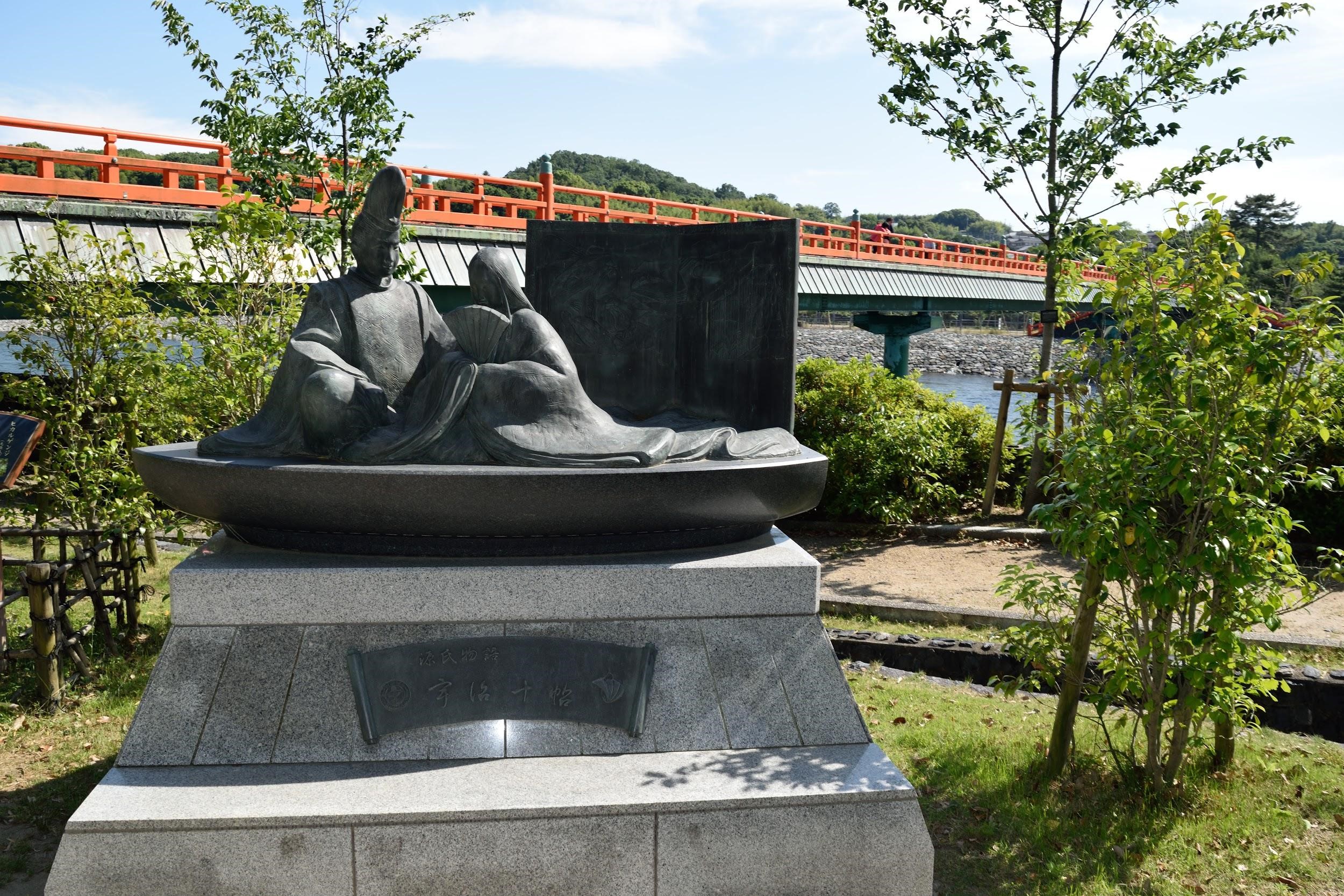
– You also started playing in concert band around that time. What prompted that?
Takeda: My mother worked as a nurse. While she was working, she raised both my 6 year younger brother and myself by herself. One summer vacation, we were taken to my grandparents’ house in the country to spend the summer. There were nothing but fields around us, I had no friends, and it was too boring…. (laughs) I wanted to stay in Uji the next year for summer vacation, so I started looking for clubs to join and so I joined the concert band when I was in my fifth year of elementary school.
Similar to Kumiko, I played the euphonium. The bass instruments weren’t as popular as the flashy instruments like trumpets, so there was room there. But as I was a bit of a rebellious child, so I thought “minor instruments are cooler anyways~” so it fit me well! (laughs) The range of a euphonium is quite broad and there are a lot of melodies you can play on it, so it was super enjoyable.
When I entered middle school, I also joined the concert band and continued to play the euphonium. The school I went to wasn’t a powerhouse, but it wasn’t a weakling either. It was on the level of “would we win gold at Kyoto Prefectural or not?” Performing itself was fun, but there were a lot of inter-personal issues as you’d expect. Concert bands have 55 people, so even if there’s just one bad person, then you can lose. But in the band you also have people who just want to have fun without giving it their all or people who prioritize studying. That difference in motivation is the cause of a lot of quarrels. In sports clubs, you have an easy to understand goal: “win.” So people are fine practicing for sports, but there’s nothing like that for concert bands. That might be another “only in concert band.”
– Did you continue writing your stories in middle school?
Takeda: Yes. At home I would write as much as I could, but as I was embarrassed like anyone would be in adolescence, I hid that from my friends. My mother would read what I handed to her and often said “Huh? It ends here?” As you’d guess, they would stop at around 4 pages like before. I remember having moments where I would think “I want to write this kind of tale” and quickly write off a scene or setting.
When I became a high schooler, I was finally able to write to the conclusion of a story. The high school I went to had a very packed library, so I was able to come in touch with a lot of different works. As it was tradition to read freely, I thoroughly enjoyed myself.
More than anything, having people who weren’t afraid to tell you what they thought was very refreshing. There were a lot of people who went to that high school with a sense of purpose, so I was blessed to meet a lot of people who felt similar to how I did. I joined the literature club in high school. Although I was present, including my upperclassmen, we didn’t even number 10 people. So all of our activities were collecting what each person wrote and publishing a journal once a year. There were almost no meetings. Speaking of activities, we would send an e-mail to our advisor when our work was about to progress further. Right now it looks like they’re more active, so I’m jealous of their experience.
– What was the reaction to the works you wrote?
Takeda: The club journal was very conservative, so I basically got no feedback there. I did help write a script for a play performed at the cultural festival, so I got some there. It’s decided that all of the first and second year classes perform an original play, so I spoke up and said “I want to write the script!” My class in second year won the best performance award. Simply put, it was a round of ghost stories with each one increasing by two people. So these two would be a bullied child and a murderer….. that kind of gag revenge tragedy. I feel like winning that award helped lift my confidence in writing stories.
Also, around that time, I would send my classmate S-chan stories every day to her cell phone like a “serial” story. I was so happy when she would say “that was good.” Eventually it became a 1,400 pg epic before I noticed its length. It’s my phantom work. (laughs)
– So S-chan was linked to starting your debut work!
Takeda: That’s right. She gave me a push saying “you wrote this, so why not send it to the Rookie of the Year awards?” When I became a university student, I planned to set up a “6 books a year plan” where at least I would practice writing 6 books in one year. Truly, the story I sent to Takarajimasha’s “Japan Love Story Awards” (Now “Japan Love Story & Entertainment Awards”), Today, We Breathed Together, was the first time that I submitted a work as a university student. I barely tied it all together and sent it off before the deadline…. But it was my first book, so it turned out alright. (laughs)
– Speaking to the judges, they were shocked that the story didn’t end; there was an abrupt “The End.” But they talked about choosing it because of the way the writing seemed to shine. At the final selection meeting, judge Ira Ishida recommended it as a “hidden ball” debut. How did you feel when you were contacted saying it would be your debut?
Takeda: I was very pleased. It was left over from the first and second selection rounds. Instead of being happy I thought “it’ll fail someway, so better not raise my hopes too highly.” (laughs) Of course I never dreamed that I would get this chance. The day that they called me was my 20th birthday. I remember the editor saying “this writing is unbelievable for a 19-year-old,” and replying “I’m sorry. Is it alright that I’ve already turned 20?” (laughs)
Challenging herself to create “content”
– What gives you the most enjoyment to do?
Takeda: I love reading books and manga, but what I enjoy the most is games. If the game I buy is enjoyable enough, then I do nothing else but play it. Right now I’m hooked on Splatoon. I’ve loved games since I was a child, so I would like to write for a game company on the side in the future. When I come home for summer, my third year high school brother would say “Sometimes you are helpful sis” when I return to play the games he buys. (laughs)
– Sounds like you two get along!
Takeda: We were born 6 years apart, so we didn’t fight growing up; we got along very well. My mother would work the night shifts, so I would watch over him when he was younger. And now that brother is a third year in high school. He may go at his own pace, but he’s someone who knows who he is. He’s bright and cheerful like my mother, so he’s a very powerful person.
– Do your mother and brother read your novels?
Takeda: Yes. Both of them read the ones I’ve published. I went home the other day and my mother saw Welcome to the Rikka High School Marching Band! at a convenience store and bought it. She said “That was good. I think that might be the story of yours I like the best.” She said she cried while looking at Azusa’s actions remembering how I was when I was younger. My brother hasn’t told me his impressions. I think he might be too embarrassed.
– So finally, please tell us what your goals are for the future.
Takeda: I want to continue writing novels. I think it’ll be better for me to write in a variety of genres. The other day I finished writing the manuscript of a mystery novel different from the Sound! Euphonium series. It was refreshing to write malicious characters. But writing a mystery gradually made me yearn for something pure…. We humans certainly yearn to eat something salty after eating something sweet.
It feels like I’ve already written all I can for wind music, but if I have time, I might write some more. I don’t know how that will turn out, but since this is a series I have a huge fondness for, I don’t want to treat it poorly. I’ll have to think about how I could make something that continues onward.
Also, I want to challenge myself beyond novels. I want to write game scripts, participate in manga/online productions, and “make content.” It’s a dream I can put in my mouth! (laughs)
Support us on Patreon so that we can keep producing all this content and fullfill our next goals, as well as affording all server expenses. Thanks!

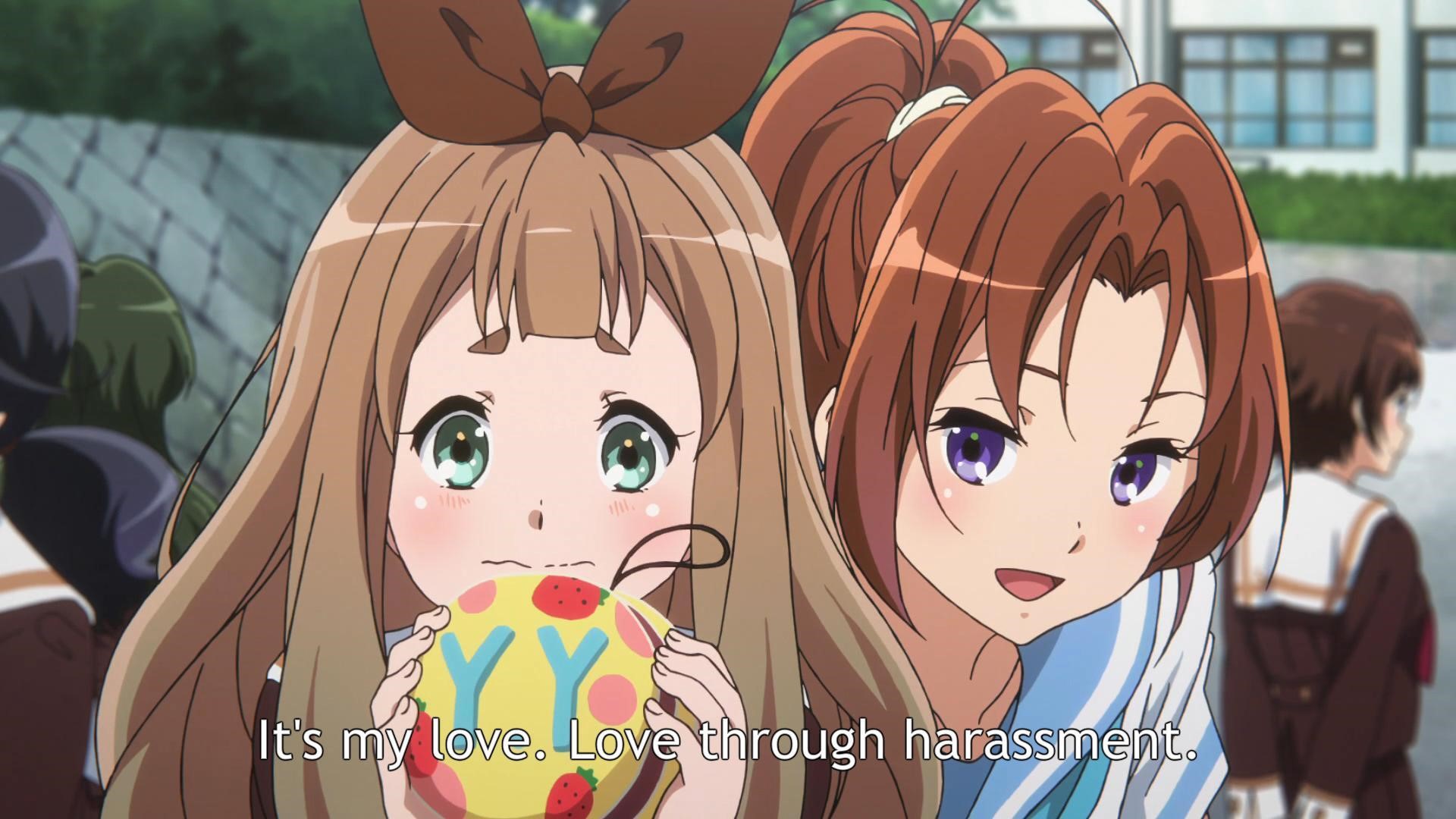


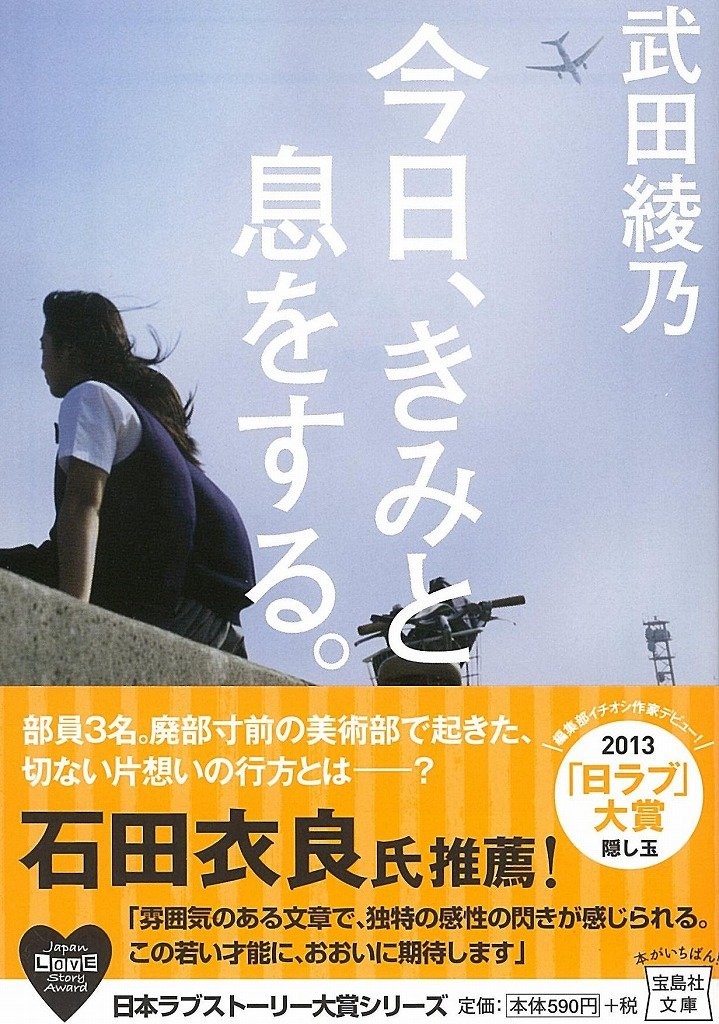
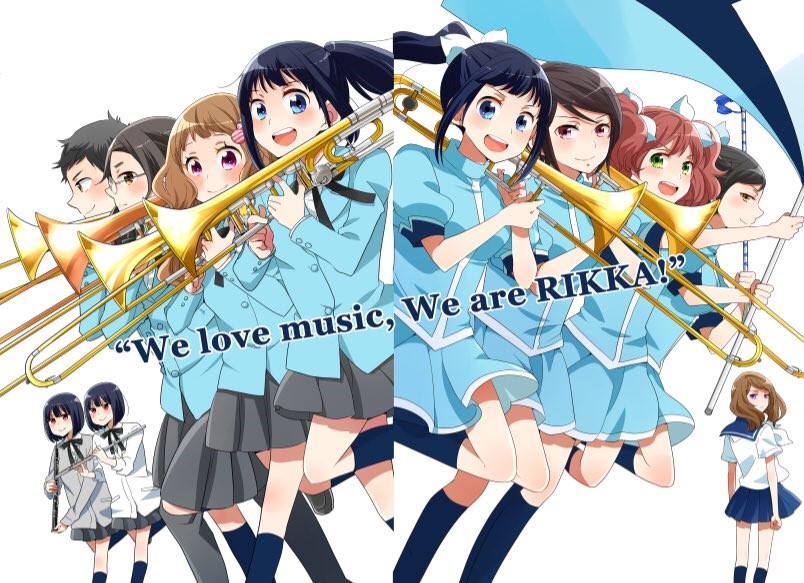
Very cool, thanks for translating this!
Thanks a lot for this! always enjoy reading these interviews.
Thank you so much for taking the time to post this! I stumbled across your blog recently after looking for Sound! Euphonium discussions. This was extremely enjoyable and interesting to read, along with all of your posts!